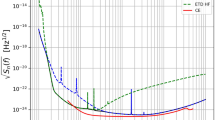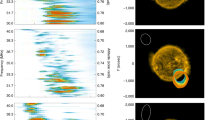Abstract
DURING the occultation of Taurus in June 1961 and 1962, centimetre wave-length observations were undertaken by U.S. Air Force Cambridge Research Laboratories scientists to investigate small-scale irregularities, if any, in the solar corona which might produce wide-angle scattering at metre wave-lengths and also be observed at centimetre wave-lengths. Results for 1962 were interpreted by Basu and Castelli1 to indicate a progressive broadening of the source and a decrease in source intensity as the angular separation between Taurus and the Sun became smaller. The reverse tendency was noted on the egress part of the cycle. The broadened maximum extent of the source was found to be about 20 min of arc at λ = 10 cm.
This is a preview of subscription content, access via your institution
Access options
Subscribe to this journal
Receive 51 print issues and online access
$199.00 per year
only $3.90 per issue
Buy this article
- Purchase on SpringerLink
- Instant access to full article PDF
Prices may be subject to local taxes which are calculated during checkout
Similar content being viewed by others
References
Basu, S., and Castelli, J., Nature, 197, 885 (1963).
Author information
Authors and Affiliations
Rights and permissions
About this article
Cite this article
CASTELLI, J. Occultation of the Crab Nebula by the Solar Corona at Centimetre Wave-lengths in June 1964. Nature 205, 1301 (1965). https://doi.org/10.1038/2051301a0
Issue date:
DOI: https://doi.org/10.1038/2051301a0



